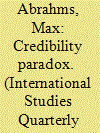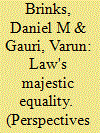|
|
|
Sort Order |
|
|
|
Items / Page
|
|
|
|
|
|
|
| Srl | Item |
| 1 |
ID:
126477


|
|
|
|
|
| Publication |
2013.
|
| Summary/Abstract |
Implicit in the rationalist literature on bargaining over the last half-century is the political utility of violence. Given our anarchical international system populated with egoistic actors, violence is thought to promote concessions by lending credibility to their threats. From the vantage of bargaining theory, then, empirical research on terrorism poses a puzzle. For nonstate actors, terrorism signals a credible threat in comparison with less extreme tactical alternatives. In recent years, however, a spate of studies across disciplines and methodologies has nonetheless found that neither escalating to terrorism nor with terrorism encourages government concessions. In fact, perpetrating terrorist acts reportedly lowers the likelihood of government compliance, particularly as the civilian casualties rise. The apparent tendency for this extreme form of violence to impede concessions challenges the external validity of bargaining theory, as traditionally understood. In this study, I propose and test an important psychological refinement to the standard rationalist narrative. Via an experiment on a national sample of adults, I find evidence of a newfound cognitive heuristic undermining the coercive logic of escalation enshrined in bargaining theory. Due to this oversight, mainstream bargaining theory overestimates the political utility of violence, particularly as an instrument of coercion.
|
|
|
|
|
|
|
|
|
|
|
|
|
|
|
|
| 2 |
ID:
132975


|
|
|
|
|
| Publication |
2014.
|
| Summary/Abstract |
While many find cause for optimism about the use of law and rights for progressive ends, the academic literature has long been skeptical that courts favor the poor. We show that, with the move toward a robust "new constitutionalism" of social and economic rights, the assumptions underlying the skepticism do not always hold. Our theories must account for variation in the elite bias of law and litigation. In particular, we need to pay closer attention to the broad, collective effects of legal mobilization, rather than focusing narrowly on the litigants and the direct benefits they receive. We support the claim by showing that litigation pursued in legal contexts that create the expectation of collective effects is more likely to avoid the potential anti-poor bias of courts. On the other hand, policy areas dominated by individual litigation and individualized effects are more likely to experience regressive outcomes. Using data on social and economic rights cases in four countries, we estimate the potential pro-poor impact of litigation by examining whether the poor are over- or under-represented among the beneficiaries of litigation. We find that the impact of courts is positive and very much pro-poor in India and South Africa, and slightly negative in Indonesia and Brazil. Overall, we challenge the tendency in the literature to focus on the direct effects of litigation, find that the results of litigation are more positive for the poor than the conventional wisdom would lead us to expect, and offer an explanation that accounts for part of the variation while raising a number of questions for future research.
|
|
|
|
|
|
|
|
|
|
|
|
|
|
|
|
|
|
|
|
|